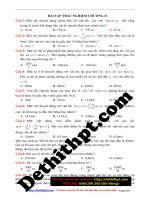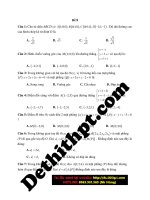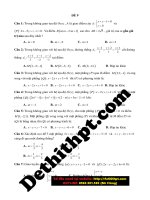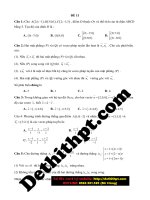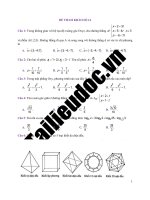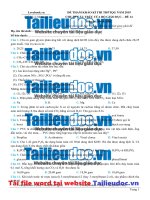Đề 14 image marked image marked
Bạn đang xem bản rút gọn của tài liệu. Xem và tải ngay bản đầy đủ của tài liệu tại đây (2.07 MB, 8 trang )
Exercise 14:
Read the following passage and mark the letter A, B, C or D to indicate the correct answer to each
of the questions.
INTERNATIONAL ORGANIZATIONS AND GLOBALIZATION
Globalization can be seen as increased economic, cultural and technological exchange between
countries. Examples might be McDonald's in Calcutta and Japanese motor technology in Britain. Many
international organizations are pro-globalization, while many others are anti- ones.
The main organizations against globalization are the environmental organizations, such as Friends
of the Earth and reenpeace, who put forward the belief that globalization harms the environment. In
general, these organizations blame global corporations for global warning and the depletion of natural
resources. The most obvious is oil and gas, but there are others such as tropical rainforests, which are cut
down for timber, and the resources of the sea, which may be affected by pollution.
Đăng ký file Word tại link sau
/>
Organizations which represent developing countries, including international aid agencies such as
Oxfam, are also against globalization. They are concerned that the global organizations, such as the
International Monetary Fund (IMF) and the World Bank, are not doing enough to help the poor and
indeed, may be adding to their problems. Some are critical of the World Trade Organization (WTO).
They argue that the WTO is making difficult for poor countries to protect and build their own industries.
On the contrary, many organizations are in favor of globalization. Perhaps the most important one is
the WTO. This organization was set up in 1995 and has 123 member countries. It administers the rules of
international trade agreed by its member countries. The WTO's rules make it difficult for a country to
favor their own industry over imports from other countries. The WTO argues that the growth of trade
between countries increases the wealth of everyone. Trade allows those who can produce goods most
cheaply to do so, thus giving everyone the best possible price.
Another pro-globalization organization is IMF. This was established after World War II in 1946. It
aims to promote international cooperation on finance and provide temporary help for countries suffering
financial problems. The IMF has 182 member countries.
Finally, the United Nations, which was established after the Second World War, has become a
promoter of globalization. It aims to promote a shared set of values in the areas of labour standards,
human rights and environmental practices between the UN and the business community.
Trang 1
QUESTIONS
Question 1: The author mentions McDonald's in Calcutta and Japanese motor technology in Britain as
examples of_________.
A. Technological exchange
B. Cultural exchange
C. friendship
D. globalization
Question 2: The term "pro-globalization" in paragraph 1 means ____.
A. supporting the phenomenon of globalization
B. the concept of globalization
C. developing professional organizations in the process of globalization
D. creating conditions for globalization to develop
Question 3: Friends of the Earth and Greenpeace are used in the passage as instances of _____.
A. organizations that support globalization
B. organizations that don't believe globalization harms the environment
C. organizations that are against globalization
D. one of the most famous organizations created as a result of globalization
Question 4: The word "others" in paragraph 2 refers to ___________.
A. global corporations
B. natural resources
C. tropical forests
D. some international organizations
Question 5: According to the passage, which of the following is NOT true?
A. Many environmental organizations are against globalization.
B. Only environmental organizations are against globalization.
C. Many organizations representing poor countries are against globalization.
D. WTO supports globalization.
Question 6: Global organizations such as IMF and World Bank are blamed for _____.
A. creating more trouble to the poor instead of helping them
B. pushing the speed of globalization too fast
C. being too slow in creating more jobs for the poor
D. not trying hard enough to provide the developing countries with enough fund
Trang 2
Question 7: All of the following are mentioned in the passage EXCEPT_____.
A. the harm globalization does to the environment.
B. promoters of globalization
C. typical international organizations
D. the reasons of globalization.
Question 8: In the passage, which of the following is NOT mentioned about WTO?
A. WTO is not criticized at all.
B. WTO has been becoming most influential for the last 14 years.
C. WTO seems to prevent the development of industry of developing countries.
D. WTO was formed in 1995.
Question 9: WTO believes that_________.
A. it's difficult for nations to favour their industry over imports.
B. trade helps produce high prices of products.
C. developed countries should help poor countries more
D. individuals'wealth will be improved if the trade between countries develops
Question 10: The main purpose of the passage is that ____________.
A. the writer wants to provide the history of globalization
B. the writer persuades readers of the negative impact of globalization
C. the writer persuades readers of the positive impact of globalization
D. the writer offers an overview of globalization
GIẢI CHI TIẾT
Question 1: The author mentions McDonald's in Calcutta and Japanese motor technology in Britain as
examples of_________.
A. Technological exchange
B. Cultural exchange
C. friendship
D. globalization
Dịch nghĩa: Tác giả nhắc đến McDonald's ở Calcutta và công nghệ mô tơ của Nhật Bản ở Anh làm ví dụ
cho ___________.
A. giao lưu công nghệ
B. giao lưu văn hoá
C. tình bạn
D. sự toàn cầu hoá
Giải thích: "Globalization can be seen as increased economic, cultural, technological exchange between
countries. Examples might be McDonald's in Calcutta and Japanese motor technology in Britain." (Sự
toàn cầu hoá có thể được coi là những sự giao lưu về kinh tế, văn hoá, công nghệ giữa các quốc gia. Ví dụ
như McDonald's ở Calcutta và công nghệ mô tơ Nhật Bản ở Anh.) Đáp án D.
Question 2: The term "pro-globalization" in paragraph 1 means ____.
A. supporting the phenomenon of globalization
B. the concept of globalization
Trang 3
C. developing professional organizations in the process of globalization
D. creating conditions for globalization to develop
Dịch nghĩa: Thuật ngữ "pro-globalization" ở đoạn 1 có nghĩa là ___.
A. ủng hộ hiện tượng toàn cầu hoá
B. khái niệm toàn cầu hoá
C. sự phát triển các tổ chức chuyên nghiệp trong quá trình toàn cầu hoá
D. tạo điều kiện cho toàn cầu hoá phát triển
Giải thích: pro-globalization (n) = supporting the phenomenon of globalization: sự ủng hộ hiện tượng
toàn cầu hoá Đáp án A.
Question 3: Friends of the Earth and Greenpeace are used in the passage as instances of _____.
A. organizations that support globalization
B. organizations that don't believe globalization harms the environment
C. organizations that are against globalization
D. one of the most famous organizations created as a result of globalization
Dịch nghĩa: Friends of the Earth và Greenpeace được sử dụng trong bài khoá làm ví dụ của _____.
A. những tổ chức ủng hộ sự toàn cầu hoá
B. những tổ chức không tin sự toàn cầu hoá gây hại cho môi
trường
C. những tổ chức chống lại sự toàn cầu hoá
D. một trong những tổ chức nổi tiếng được thành lập là kết quả
của sự toàn cầu hoá
Giải thích: "The main organizations against globalization are the
environmental organization, such as Friends of the Earth and
Greenpeace,..." (Những tổ chức chủ yếu chống lại sự toàn cầu hoá
là những tổ
chức về môi trường như Friends of the Earth và Greenpeace,...).
Question 4: The word "others" in paragraph 2 refers to __________.
A. global corporations
B. natural resources
C. tropical forests
D. some international organizations
Dịch nghĩa: Từ "others" ở đoạn 2 nhắc đến _______.
A. các công ty quốc tế
B. tài nguyên thiên nhiên
C. rừng nhiệt đới
D. một số tổ chức quốc tế
Giải thích:"... the depletion of natural resources. The most ovious are oil and gas, but there are others
such as tropical rainforests,..." (...sự cạn kiệt của tài nguyên thiên nhiên. Điểu rõ ràng nhất là dầu và khí,
nhưng cũng có những thứ khác như rừng rậm nhiệt đới...). Đáp án B.
Question 5: According to the passage, which of the following is NOT true?
A. Many environmental organizations are against globalization.
Trang 4
B. Only environmental organizations are against globalization.
C. Many organizations representing poor countries are against globalization.
D. WTO supports globalization.
Dịch nghĩa: Theo bài khoá, câu nào sau đây KHÔNG đúng?
A. Nhiều tổ chức bảo vệ môi trường chống lại sự toàn cầu hoá.
B. Chỉ các tổ chức bảo vệ môi trường chống lại sự toàn cầu hoá.
C. Nhiều tổ chức đại diện cho các nước nghèo chống lại sự toàn cầu hoá.
D. WTO ủng hộ sự toàn cầu hoá.
Giải thích: "Organizations which represent developing countries, including international aid agencies
such as Oxfarm, are also against globalization." (Những tổ chức đại diện cho những nước đang phát triển,
bao gồm cả cơ quan cứu trợ quốc tế như Oxfarm, cũng chống lại sự toàn cầu hoá). Đáp án B.
Question 6: Global organizations such as IMF and World Bank are blamed for_______.
A. creating more trouble to the poor instead of helping them
B. pushing the speed of globalization too fast
C. being too slow in creating more jobs for the poor
D. not trying hard enough to provide the developing countries with enough fund
Dịch nghĩa: Các tổ chức toàn cầu như IMF và Ngân hàng Thế giới đang bị đổ lỗi cho _____.
A. tạo ra nhiều vấn đề hơn cho người nghèo thay vì giúp đỡ họ.
B. đẩy tốc độ của toàn cầu hóa quá nhanh.
C. quá chậm chạp trong việc tạo thêm việc làm cho người nghèo.
D. không đủ cố gắng để cung cấp cho các nước đang phát triển với đủ quỹ.
Giải thích: "They are concerned that the global organizations, such as International Monetary Fund
(IMF) and the World Bank, are not enough doing enough to help the poor and indeed, may be adding to
their problems." (Họ cho rằng các tổ chức quốc tế, như Quỹ Tiền tệ Thế giới (IMF) và Ngân hàng Thế
giới không làm đủ để giúp đỡ người nghèo mà thực tế còn làm tăng những gánh nặng cho họ.) Đáp án A.
Question 7: All of the following are mentioned in the passage EXCEPT _____.
A. the harm globalization does to the environment.
B. promoters of globalization
C. typical international organizations
D. the reasons of globalization.
Dịch nghĩa: Tất cả những điều sau đây được đề cập trong đoạn văn TRỪ ______.
A. tác hại của toàn cầu hóa gây ra cho cho môi trường.
B. những người ủng hộ toàn cầu hóa
C. các tổ chức quốc tế tiêu biểu
D. những lý do cho toàn cầu hóa
Giải thích: + Câu A:" In general, these organizations blame global corporation for global warming and
the depletion of natural resources. The most ovious are oil and gas, but there are others such as tropical
rainforests, which are cut down for timber and the resouces of the sea, which may be affected by
pollution" (...sự cạn kiệt của tài nguyên thiên nhiên). Nói chung, những tổ chức này đổ lỗi cho các công ty
quốc tế vì sự nóng lên toàn cầu và sự cạn kiệt của tài nguyên thiên nhiên. Điều rõ ràng nhất là dầu và khí,
nhưng cũng có những thứ khác như rừng mưa nhiệt đới, đã bị chặt lấy gỗ và tài nguyên biển có thể đã bị ô
nhiễm ảnh hưởng.)
Trang 5
+ Câu B:"On the contrary, many organizations are in favour of globalization..." (Trái lại, nhiều tổ chức
ủng hộ sự toàn cầu hoá.) Tác giả nhắc đến một số tổ chức ủng hộ toàn cầu hoá là WTO, IMF và UN ở các
đoạn 3,4, 5.
+ Câu C: Trong toàn bài, tác giả đã nhắc đến nhiều tổ chức quốc tế tiêu biểu như WTO, UN, IMF,
Oxfarm,... Vậy chỉ có đáp án D là không có thông tin trong bài.
Question 8: In the passage, which of the following is NOT mentioned about WTO?
A. WTO is not criticized at all.
B. WTO has been becoming most influential for the last 14 years.
C. WTO seems to prevent the development of industry of developing countries.
D. WTO was formed in 1995.
Dịch nghĩa: Trong bài, điều nào dưới đây KHÔNG được đề cập về WTO?
A. WTO bị chỉ trích.
B. WTO đã trở nên có sức ảnh hưởng nhất trong 14 năm qua.
C. WTO có vẻ đang ngăn cản sự phát triển của ngành công nghiệp của các nước đang phát triển.
D. WTO được thành lập vào năm 1995.
Giải thích: + Câu A:"Some are critical of the World Trade Organization (WTO)..."(Một số người chỉ
trích Tổ chức Thương mại Thế giới (WTO).
+ Câu C:"... the WTO is making it difficult for poor countries to protect and build their own
industries."(WTO đang làm khó khăn hơn cho những nước nghèo bảo vệ và xây dựng nền công nghiệp
của mình.)
+ Câu D: "Perhap the most important one is the WTO. This organization is established in 1995..." (Có lẽ
quan trọng nhất là WTO. Tổ chức này được thành lập năm 1995...). Đáp án B.
Question 9: WTO believes that __________.
A. it's difficult for nations to favour their industry over imports.
B. trade helps produce high prices of products.
C. developed countries should help poor countries more
D. individuals'wealth will be improved if the trade between countries develops
Dịch nghĩa: WTO tin rằng _______.
A. thật là khó khăn cho các quốc gia ưu tiên cho ngành công nghiệp của họ hơn nhập khẩu
Trang 6
B. thương mại giúp sản xuất ra những sản phẩm giá cao
C. các nước phát triển nên giúp các nước nghèo hơn
D. sự giàu có của các cá nhân sẽ được cải thiện nếu thương mại giữa các quốc gia phát triển
Giải thích: "The WTO argues that the growth of trade between countries increases the weath of
everyone." (WTO cho rằng sự tăng trưởng của thương mại giữa các nước làm tăng tài sản của mọi người.)
Đáp án D.
Question 10: The main purpose of the passage is that ____________.
A. the writer wants to provide the history of globalization
B. the writer persuades readers of the negative impact of globalization
C. the writer persuades readers of the positive impact of globalization
D. the writer offers an overview of globalization
Dịch nghĩa: Mục đích chính của bài văn là ____.
A nhà văn muốn cung cấp lịch sử của toàn cầu hóa.
B. nhà văn thuyết phục độc giả về những tác động tiêu cực của toàn cầu hóa.
C. nhà văn thuyết phục độc giả về những tác động tích cực của toàn cầu hóa.
D. nhà văn cung cấp một cái nhìn tổng quan về toàn cầu hóa.
Giải thích: Đọc toàn bài, ta nhận thấy tác giả cung cấp cho độc giả cái nhìn tổng quan về toàn cầu hoá
bằng cách đưa ra các ý kiến trái chiều của các tổ chức ủng hộ và không ủng hộ sự toàn cầu hoá và những
tác động của toàn cầu hoá đối với môi trường, với các nước đã và đang phát triển và với mỗi cá nhân.
→ Đáp án D.
DỊCH BÀI
Các tổ chức quốc tế và sự toàn cầu hóa
Sự toàn cầu hoá có thể được xem như là sự gia tăng giao lưu về kinh tế, văn hoá, công nghệ giữa
các quốc gia. Ví dụ như McDonald's ở Calcutta và công nghệ mô tơ Nhật Bản ở Anh. Nhiều tổ chức quốc
tế ủng hộ cho toàn cầu hóa trong khi những tổ chức khác thì chống lại.
Những tổ chức chủ yếu chống lại sự toàn cầu hoá là những tổ chức về môi trường như Friends of the
Earth và Greenpeace, đã đưa ra những tư tưởng rằng sự toàn cầu hoá gây hại cho môi trường. Nói chung,
những tổ chức này đổ lỗi cho các tập đoàn quốc tế vì sự nóng lên toàn cầu và sự cạn kiệt của tài nguyên
thiên nhiên. Điều rõ ràng nhất là dầu và khí, nhưng cũng có những thứ khác như rừng mưa nhiệt đới, đã bị
chặt để lấy gỗ và tài nguyên biển có thể đã bị ô nhiễm ảnh hưởng.
Những tổ chức đại diện cho những nước đang phát triển, bao gồm cả cơ quan cứu trợ quốc tế như
Oxfarm, cũng chống lại sự toàn cầu hoá. Họ cho rằng các tổ chức quốc tế, như QuỹTiền tệ Thế giới (IMF)
và Ngân hàng Thế giới không làm đủ để giúp đỡ người nghèo mà thực tế còn làm tăng những gánh nặng
cho họ. Một số người chỉ trích Tổ chức Thương mại Thế giới (WTO). Họ cho rằng WTO đang làm khó
khăn hơn cho những nước nghèo bảo vệ và xây dựng nền công nghiệp của mình.
Trái lại, nhiều tổ chức ủng hộ sự toàn cầu hoá. Có lẽ quan trọng nhất là WTO. Tổ chức này được
thành lập năm 1995 và có 123 đất nước thành viên. Nó quản lý luật thương mại quốc tế được thống nhất
bởi các nước thành viên. Luật của WTO gây khó khăn cho một nước ưu tiên nền công nghiệp của mình
hơn là nhập khẩu từ các nước khác. WTO cho rằng sự tăng trưởng của thương mại giữa các nước làm
Trang 7
tăng tài sản của mọi người. Giao thương cho phép mọi người có thể sản xuất hàng hoá với giá rẻ nhất, do
đó mang lại cho mọi người mức giá tốt nhất có thể.
Một tổ chức hỗ trợ toàn cầu hoá khác là IMF. Tổ chức này được thành lập sau thế chiến thứ 2 năm
1946. Nó hướng đến việc nâng cao sự hợp tác quốc tế vể mặt tài chính và cung cấp sự hỗ trợ tạm thời cho
các nước đang đối mặt với các vấn đề tài chính. IMF có 182 nước thành viên.
Cuối cùng, Liên hợp quốc, thành lập sau Thế chiến thứ 2, đã trở thành tổ chức ủng hộ sự toàn cầu
hoá. Nó hướng đến việc phát triển những quỵ ước giá trị chung trong những lĩnh vực tiêu chuẩn lao động,
quyền con người, các hoạt động vì môi trường giữa liên hợp quốc và cộng đồng kinh tế.
Trang 8
